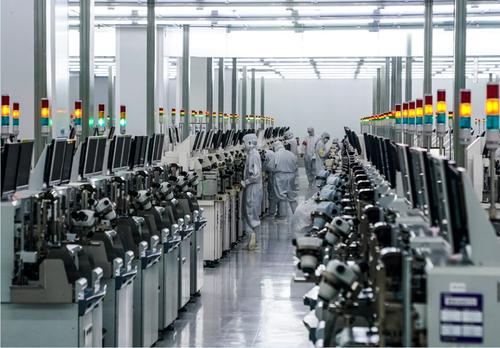1. China needs to develop its auto chip sector, official says

Local Chinese companies are urged to develop automotive chips and cut reliance on imports as semiconductor shortages hit the auto industry across the globe.
Miao Wei, former minister of industry and information technology, said a lesson from the global chip shortages is that China needs its own independent and controllable auto chip industry.
Miao, now a senior official at the National People Consultative Conference, made the remarks at the China Auto Show held in Shanghai from June 17 to 19.
Efforts should be made in fundamental research and prospective studies to chart a roadmap for the sector's development, he said.
"We are in an age where software defines cars, and cars need CPUs and operating systems. So we should plan in advance," said Miao.
Chip shortages are cutting global vehicle production. Last month, vehicle sales in China dipped 3 percent, primarily because carmakers failed to acquire enough chips.
Electric car startup Nio delivered 6,711 vehicles in May, up 95.3 percent from the same month last year.
The carmaker said its deliveries would have been higher if not for the chip shortages and logistical adjustments.
Chipmakers and auto suppliers are already working around the clock to solve the problem, while authorities are improving coordination among companies in the industrial chain for better efficiency.
Dong Xiaoping, an official at the Ministry of Industry and Information Technology, said the ministry has asked local automobile makers and semiconductor companies to compile a brochure to better match their supply and demand of auto chips.
The ministry is also encouraging insurance companies to roll out insurance services that can boost local automakers' confidence in using indigenously-produced chips, so as to help ease chip shortages.
2. US supply chain disruptions hit consumers

At the beginning and amid the COVID-19 pandemic in the US, it was a shortage of toilet paper that sent people into a panic.
With the rolling out of COVID-19 vaccines, people now are finding that some of their favorite drinks at Starbucks aren't currently available.
Starbucks put 25 items on "temporary hold" in early June due to a disruption in supply chains, according to Business Insider. The list included popular items like hazelnut syrup, toffee nut syrup, chai tea bags, green iced tea, cinnamon dolce latte and white chocolate mocha.
"This peach and guava juice shortage at Starbucks is upsetting me and my homegirls," Mani Lee tweeted.
"Am I the only one having a crisis over @Starbucks having a literal shortage of caramel right now," Madison Chaney tweeted.
Supply chain disruptions in the US due to operations shutting down during the pandemic, cargo shipping delays, a shortage of workers, pent-up demand and a quicker than expected economic recovery are affecting more than some people's favorite drinks.
The US Labor Department reported last week that the annual inflation rate in May 2021 was 5 percent, the highest since the 2008 financial crisis.
House prices have gone up almost 20 percent on average nationwide due to a lumber shortage, which drove lumber prices up four to five times of pre-pandemic levels.
For those furnishing or updating their homes, a delay in furniture delivery can stretch for months and months.
"I ordered an end table from a well-known, upscale furniture store in February. I was told to expect delivery in 14 weeks. I recently checked my order status. Customer service apologized and told me it would now be September. Good things come to those who wait?" Eric West commented on a story by The Wall Street Journal.
"The real truth is broader. I ordered chairs, a sofa, and ottomans, some of which take 6 months to be delivered because they are made in China, bought from a huge American company known as NFM. So this slowdown is broad and deep," wrote Journal reader Tim Mason.
Appliance-buyers are running into the same issue.
"I am told that the $1,000 freezer I ordered will be available in three months. Oh well, the real damage of the pandemic is yet to be fully realized," wrote reader Bill Poulos.
MarketWatch reported that Costco Wholesale Corp listed a wide range of supply chain problems primarily due to shipping delays.
"From a supply chain perspective, port delays are continuing to have an impact," Richard Galanti, Costco's CFO, was quoted as saying. "The feeling is that this will continue for the most part of this calendar year."
The Biden administration announced last week that it was forming a task force to address supply bottlenecks in semiconductor, construction, transportation and agricultural sectors.
The 250-page White House report titled "Building Resilient Supply Chains, Revitalizing American Manufacturing, and Fostering Broad-Based Growth" aims to increase domestic manufacturing, limit shortages of vital goods and reduce a dependence on geopolitical competitors.
The report emphasized the supply chain's importance to national security, economic stability and global leadership. It pointed out that the coronavirus pandemic exposed America's supply chain vulnerabilities.
"The success of our vaccination campaign surprised many people, and so they weren't prepared for demand to rebound," Sameera Fazili, a deputy director of the White House National Economic Council, said at a White House news briefing last week. She expects the inflation to be temporary and resolved in the "next few months".
The Department of Health and Human Services also will commit $60 million to create a public-private partnership for manufacturing essential pharmaceutical drugs.
The Labor Department will spend $100 million in grants for state-led apprenticeship programs. The Agriculture Department will spend more than $4 billion to strengthen the supply chain for food.
3. Chip shortages lower auto sales

May figure down 3% year-on-year to 2.13m vehicles, the first decline since April 2020
Vehicle sales in China fell for the first time in 14 months in May as manufacturers delivered fewer vehicles to the market due to global semiconductor shortages, according to industry data.
Last month, 2.13 million vehicles were sold in the world's largest vehicle market, down 3.1 percent on a yearly basis, the China Association of Automobile Manufacturers said. It was the first decline in China since April 2020, when the country's vehicle market started to rebound from the COVID-19 pandemic.
The CAAM also said it was cautiously optimistic on the performance of the sector in the remaining months.
Shi Jianhua, deputy secretary-general of the association, said global chip shortages have been hurting the industry since late last year. "The impact on production is continuing, and the sales figures in June will be affected as well," he said.
Electric car startup Nio delivered 6,711 vehicles in May, up 95.3 percent from the same month last year. The carmaker said its deliveries would have been higher if not for the chip shortages and logistical adjustments.
SAIC Volkswagen, one of the country's leading carmakers, has already cut output at some of its plants, especially production of high-end models that require more chips, according to Shanghai Securities Daily.
The China Auto Dealers Association, another industry association, said inventories are declining steadily at many automobile dealers and some models are in short supply.
Jiemian, a Shanghai-based news portal, said SAIC GM's production in May fell 37.43 percent to 81,196 vehicles primarily due to chip shortages.
However, Shi said the shortages will start easing in the third quarter and the overall situation will turn for the better in the fourth quarter.
Chipmakers and auto suppliers are already working around the clock to solve the problem, while authorities are improving coordination among companies in the industrial chain for better efficiency.
The Ministry of Industry and Information Technology, the nation's top industry regulator, has asked local automobile makers and semiconductor companies to compile a brochure to better match their supply and demand of auto chips.
The ministry is also encouraging insurance companies to roll out insurance services that can boost local automakers' confidence in using indigenously-produced chips, so as to help ease chip shortages. On Friday, four Chinese chip design companies inked agreements with three local insurance companies to pilot such insurance services.
Earlier this month German auto parts supplier Bosch opened a $1.2 billion chip plant in Dresden, Germany, saying that its automotive chips are expected to roll out in September this year.
Despite the sales fall in May, the CAAM said it is optimistic about the market's whole year performance because of China's economic resilience and soaring sales of new energy cars.
Shi said the association is considering raising the estimate for this year's sales growth to 6.5 percent from 4 percent, which was made at the start of the year.
"Overall vehicle sales this year are likely to reach 27 million units, while sales of new energy vehicles may touch 2 million units, up from our previous estimate of 1.8 million," said Shi.
Statistics from the association show that 10.88 million vehicles were sold in China in the first five months, up 36 percent year-on-year.
Sales of electric cars and plug-in hybrids reached 217,000 units in May, up 160 percent on a yearly basis, bringing the total from January to May to 950,000 units, over three times the figure a year ago.
The China Passenger Car Association was even more optimistic about the full-year performance and hiked its new energy vehicle sales target to 2.4 million units this year.
Cui Dongshu, secretary-general of the CPCA, said his confidence came from such vehicles' growing popularity in the country and their increased exports to overseas markets.
Nio said it will accelerate efforts in June to make up for the loss caused last month. The startup said it will maintain the delivery target of 21,000 units to 22,000 units in the second quarter of this year. Its models will be available in Norway in September. Tesla sold 33,463 China-made vehicles in May, of which a third were exported. Cui estimated that Tesla's exports from China would hit 100,000 units this year.
Post time: Jun-23-2021
